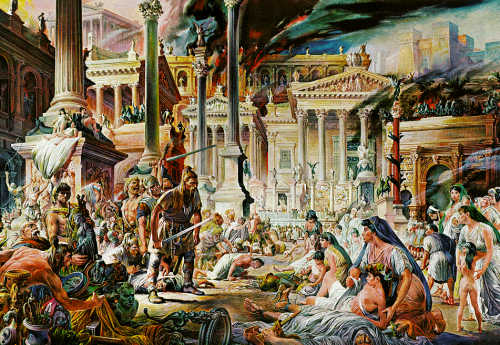If the coast of California is
“postmodern,” as its residents like to say, we in the state’s interior are now
premodern. Out here in the San Joaquin Valley, civilization has zoomed into
reverse, a process that I witness regularly on my farm in Selma, near Fresno.
Last summer, for example, intruders ripped the copper conduits out of two of my
agriculture pumps. Later, thieves looted the shed. I know no farmer in a
five-mile radius who has escaped such thefts; for many residents of central
California, confronting gang members casing their farms for scrap metal is a
weekly occurrence. I chased out two last August. One neighbor painted his pump
with the Oakland Raiders’ gray and black, hoping to win exemption from thieving
gangs. No luck. My mailbox looks armored because it is: after starting to lose
my mail once or twice each month, I picked a model advertised to resist an
AK-47 barrage.
I bicycle twice a
week on a 20-mile route through the countryside, where I see trash—everything
from refrigerators to dead kittens—dumped along the sides of less traveled
roads. The culprits are careless; their names, on utility-bill stubs and junk
mail, are easy to spot. This summer, I also saw a portable canteen unplug its
drainage outlet and speed off down the road, with a stream of cooking waste
leaking out onto the pavement. After all, it is far cheaper to park a canteen
along a country road, put up an awning over a few plastic chairs and tables,
and set up an unregulated, tax-free roadside eatery than to battle the array of
state regulations required to establish an in-town restaurant. Six such movable
canteens line the road a mile from my farm. For that matter, I can buy a new,
tax-free lawnmower, mattress, or shovel at the ad hoc emporia at dozens of
rural crossroads. Who knows where their inventory comes from?
Few
residence-zoning laws are enforced in the rural interior of highly regulated
California. My neighbors often plop down broken Winnebagos—three or four per
acre—and add a few Porta-Potties and propane grills, thereby creating a
hacienda of renters. You can earn the ire of a building inspector in Menlo Park
if your new fence is an inch too high, but out here in the outback, no one
cares if you crowd 40 adults onto your premises.
To be in a car
accident in rural central California, as I have been three times, is often to
have the assailant driver flee the scene, or to learn later that he lacked
license, registration, and insurance. About once every three years, I find a
car—again, lacking registration and insurance—that has veered off the road into
my vineyard, destroying thousands of dollars’ worth of vines, and been
abandoned.
Law enforcement
seems not so much overburdened as brilliantly entrepreneurial. Patrol cars
flood the highways as never before, looking for the tiniest revenue-raising
infraction; the police realize that going after the man who throws a freezer
into the local pond is costly and futile, while citing the cell-phone-using but
otherwise responsible driver is profitable. In 2009, the most recent year for which
traffic statistics have been released, the highway patrol issued 200,000 more
violations than in 2006.
As I write, my
local community is confronting a peculiar epidemic. Bronze dedicatory plaques
are being stolen from our ancestral institutions—churches, halls, clubs,
parks—many of which my grandparents and great-grandparents helped establish. No
records exist for most of the ancient dedicatory names, so all prior
benefaction has been erased from our collective memory—and all for the recycled
meltdown that supplies only a day or two’s drugs for the thieves. For central
California’s parasitic criminal class, melting down what the departed
bequeathed us is a growth industry. It reminds me of the fifteenth-century
Turkish occupation of Greece, when scavengers pried the lead seals off the
building clamps of classical temples, destroying in decades what nature had not
damaged in centuries.
The world outside
my window reminds me a lot of what my grandfather told me about the wilderness
that his pioneer grandmother discovered on arriving here in the 1870s. We’ve
come full circle, tearing up what was handed down.

No comments:
Post a Comment